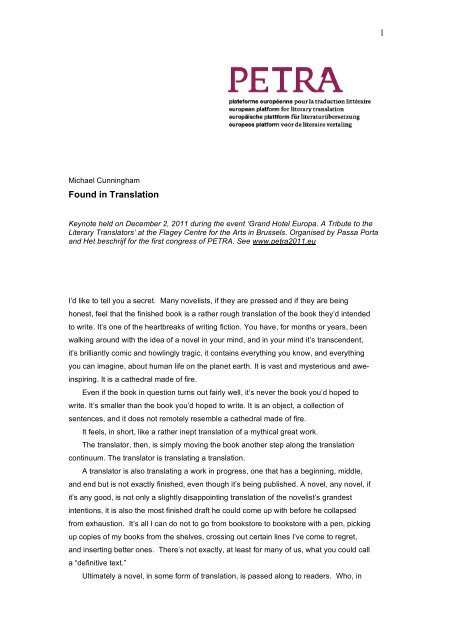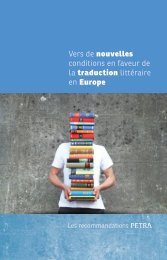Michael Cunningham Found in Translation - Petra
Michael Cunningham Found in Translation - Petra
Michael Cunningham Found in Translation - Petra
Create successful ePaper yourself
Turn your PDF publications into a flip-book with our unique Google optimized e-Paper software.
1<strong>Michael</strong> <strong>Cunn<strong>in</strong>gham</strong><strong>Found</strong> <strong>in</strong> <strong>Translation</strong>Keynote held on December 2, 2011 dur<strong>in</strong>g the event ‘Grand Hotel Europa. A Tribute to theLiterary Translators’ at the Flagey Centre for the Arts <strong>in</strong> Brussels. Organised by Passa Portaand Het beschrijf for the first congress of PETRA. See www.petra2011.euI’d like to tell you a secret. Many novelists, if they are pressed and if they are be<strong>in</strong>ghonest, feel that the f<strong>in</strong>ished book is a rather rough translation of the book they’d <strong>in</strong>tendedto write. It’s one of the heartbreaks of writ<strong>in</strong>g fiction. You have, for months or years, beenwalk<strong>in</strong>g around with the idea of a novel <strong>in</strong> your m<strong>in</strong>d, and <strong>in</strong> your m<strong>in</strong>d it’s transcendent,it’s brilliantly comic and howl<strong>in</strong>gly tragic, it conta<strong>in</strong>s everyth<strong>in</strong>g you know, and everyth<strong>in</strong>gyou can imag<strong>in</strong>e, about human life on the planet earth. It is vast and mysterious and awe<strong>in</strong>spir<strong>in</strong>g.It is a cathedral made of fire.Even if the book <strong>in</strong> question turns out fairly well, it’s never the book you’d hoped towrite. It’s smaller than the book you’d hoped to write. It is an object, a collection ofsentences, and it does not remotely resemble a cathedral made of fire.It feels, <strong>in</strong> short, like a rather <strong>in</strong>ept translation of a mythical great work.The translator, then, is simply mov<strong>in</strong>g the book another step along the translationcont<strong>in</strong>uum. The translator is translat<strong>in</strong>g a translation.A translator is also translat<strong>in</strong>g a work <strong>in</strong> progress, one that has a beg<strong>in</strong>n<strong>in</strong>g, middle,and end but is not exactly f<strong>in</strong>ished, even though it’s be<strong>in</strong>g published. A novel, any novel, ifit’s any good, is not only a slightly disappo<strong>in</strong>t<strong>in</strong>g translation of the novelist’s grandest<strong>in</strong>tentions, it is also the most f<strong>in</strong>ished draft he could come up with before he collapsedfrom exhaustion. It’s all I can do not to go from bookstore to bookstore with a pen, pick<strong>in</strong>gup copies of my books from the shelves, cross<strong>in</strong>g out certa<strong>in</strong> l<strong>in</strong>es I’ve come to regret,and <strong>in</strong>sert<strong>in</strong>g better ones. There’s not exactly, at least for many of us, what you could calla “def<strong>in</strong>itive text.”Ultimately a novel, <strong>in</strong> some form of translation, is passed along to readers. Who, <strong>in</strong>
2turn, perform translations of their own.One of the more remarkable aspects of writ<strong>in</strong>g and publish<strong>in</strong>g is the fact that no tworeaders ever read the same book. We will all feel differently about a movie or a play or apa<strong>in</strong>t<strong>in</strong>g or a song, but we have all undeniably seen or heard the same movie, play,pa<strong>in</strong>t<strong>in</strong>g, or song. They are physical entities. A pa<strong>in</strong>t<strong>in</strong>g by Velasquez is purely and simplyitself, as is the Brahms Requiem. If you walk <strong>in</strong>to the appropriate gallery <strong>in</strong> the Prado, or ifyou go to a concert hall to hear an orchestra play the Brahms, you will see the pa<strong>in</strong>t<strong>in</strong>g orhear the music. You have no choice.Writ<strong>in</strong>g, however, does not exist without an active, consent<strong>in</strong>g reader. Writ<strong>in</strong>g requiresa different level of participation. Words on paper are abstractions, and everyone whoreads words on paper br<strong>in</strong>gs to them a different set of associations and images. I havevivid mental pictures of Don Quixote, Anna Karen<strong>in</strong>a, and Huckleberry F<strong>in</strong>n, but I feelconfident they are not identical to the images carried <strong>in</strong> the m<strong>in</strong>d of anyone else.It’s true as well that <strong>in</strong> those books, certa<strong>in</strong> aspects matter to some of us more thanthey do to others. In Anna Karen<strong>in</strong>a, for <strong>in</strong>stance, I remember most vividly the momentwhen Anna is on her way to the tra<strong>in</strong> station, and one of her thoughts it, Now everyonewill know how unhappy I really was. Tolstoy’s <strong>in</strong>sight <strong>in</strong>to the suicidal impulse – the ideathat at the most extreme of all human moments, a certa<strong>in</strong> pett<strong>in</strong>ess and petulance mightstill be present – made me a slave to Tolstoy for the rest of my life. I’m sure it passedunnoticed by any number of other readers.What the reader is do<strong>in</strong>g, then, is translat<strong>in</strong>g the words on the pages <strong>in</strong>to his or herown private, imag<strong>in</strong>ary lexicon, accord<strong>in</strong>g to his or her <strong>in</strong>terests and needs and levels ofcomprehension, accord<strong>in</strong>g to his or her temperament.And so. At one po<strong>in</strong>t we have a writer <strong>in</strong> a room, struggl<strong>in</strong>g to approximate theimpossible vision that hovers over his head. He f<strong>in</strong>ishes it, with misgiv<strong>in</strong>gs. Some timelater we have a translator struggl<strong>in</strong>g to approximate the vision, not to mention theparticulars of language and voice, of the text that lies before him. He does the best hecan, but is never satisfied. And then, f<strong>in</strong>ally, the reader. The reader is the least tortured ofthis trio, but the reader too may very well feel that he is miss<strong>in</strong>g someth<strong>in</strong>g <strong>in</strong> the book,that through sheer <strong>in</strong>eptitude he is fail<strong>in</strong>g to be a proper vessel for the book’s overarch<strong>in</strong>gvision.I don’t mean to suggest that writer, translator, and reader are all engaged <strong>in</strong> a massexercise <strong>in</strong> disappo<strong>in</strong>tment. How depress<strong>in</strong>g would that be? And how untrue.Still. We, as a species, are always look<strong>in</strong>g for cathedrals made of fire, and part of thethrill of read<strong>in</strong>g a great book is the promise of another yet to come, a book that may moveus even more deeply, raise us even higher. One of the consolations of writ<strong>in</strong>g books is theseem<strong>in</strong>gly unquenchable conviction that the next book will be better, will be bigger andbolder and more comprehensive and truer to the lives we live. We exist <strong>in</strong> an ongo<strong>in</strong>gcondition of hope, we love the beauty and truth that come to us, and do our best to tampdown our doubts and disappo<strong>in</strong>tments.
3We are on a quest, and are not discouraged by our collective suspicion that theperfection we look for <strong>in</strong> art is about as likely to turn up as is the Holy Grail. That is one ofthe reasons why we, I mean we humans, are not only the creators, translators, andconsumers of literature, but also its subjects.





